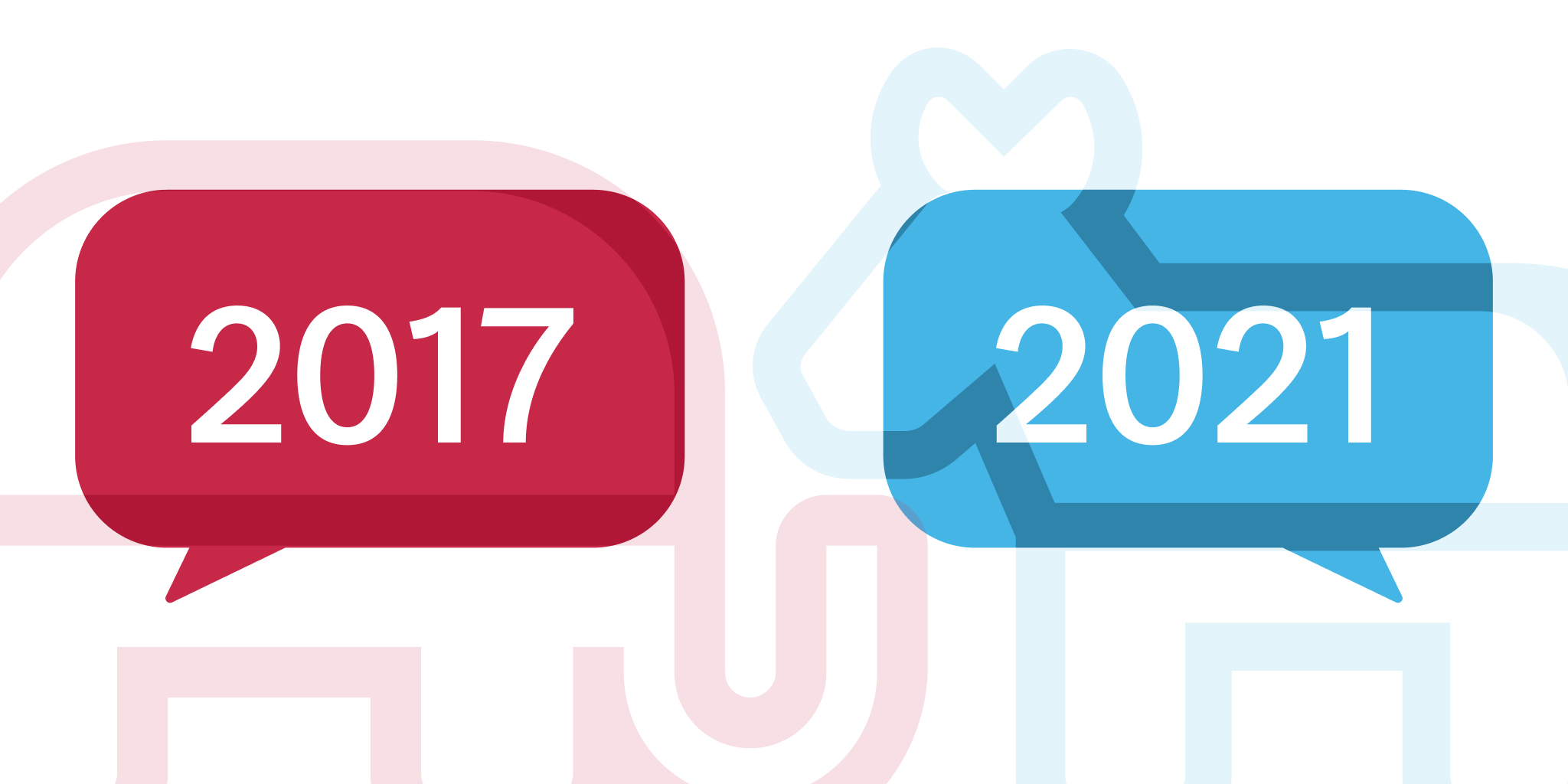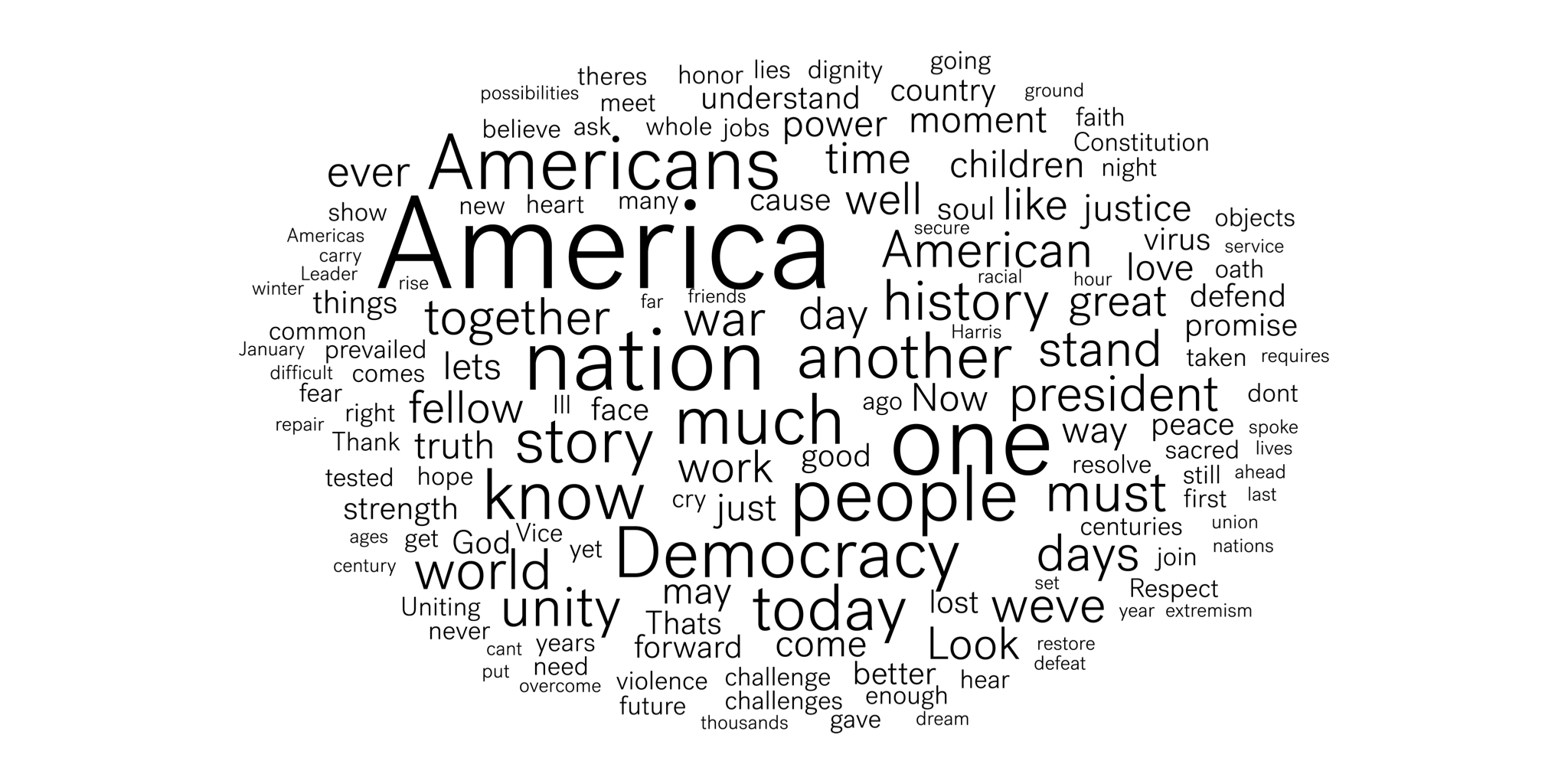What a president sounds like: Dominance vs. democracy

The road to this morning’s inauguration has been filled with history-defining moments. The white supremacist attack on the Capitol two weeks ago during election certification. The backdrop of the global pandemic, national protests about racial injustice, and huge economic struggle for many working Americans. At the inauguration itself, the swearing in of our nation’s first woman, first African-American, and first Asian-American as Vice President. The brilliant performance of youth Poet Laureate Amanda Gorman.
All of these events provide valid lenses through which historians will be studying this inauguration for decades to come. But for me, one of the most immediately accessible lenses is a linguistic one. The words we use show what we truly value, and our 45th and 46th presidents just don’t sound the same.
If Donald Trump’s inauguration speech from four years ago will be remembered for its visceral references to American carnage, Joe Biden’s speech this morning was an impassioned call for unity. Biden used the word no fewer than eight times in his 21-minute speech.
To be sure, there are some basic language patterns that both Trump and Biden share. But once you get beyond the basics — every incoming president talks about America, our nation, and the world — these two speeches could not look more different.

One of the most striking aspects of Joe Biden’s inauguration speech this morning is how much he went back to presidential basics. Yes, he talked a lot about racial justice, COVID-19, and the economic hardship facing many Americans as he starts his presidential term. He is starting his presidency under exceptionally challenging conditions, and his speech reflects our current reality.
But like all presidential speeches, Biden’s inaugural remarks transcend current circumstances, and provide a chance for him to tell the nation who he is at his core. In Biden’s case, the speech rests on two prevailing and timeless pillars: his commitment to his religious faith and his commitment to constitutional democracy. In fact, he uses the word democracy 11 different times (compare to Trump four years ago, whose speech didn’t mention democracy at all).
Language that explicitly centers on democracy and the US Constitution is infused throughout Biden’s speech. Often the concepts are intertwined.
“This is democracy’s day, a day of history and hope, of renewal and resolve through a crucible for the ages.”
“We’ve learned again that democracy is precious. Democracy is fragile. And at this hour, my friends, democracy has prevailed.”
“If you still disagree, so be it. That’s democracy.”
“I will always level with you. I will defend the Constitution. I’ll defend our democracy. I’ll defend America.”
This is in stark contrast to Trump’s speech four years ago, which does not mention democracy or the US constitution even once.
Trump’s speech mostly sounds like Trump. He speaks categorically, and his theme is world domination. If he doesn’t mention the constitution, he sure focuses a lot on winning, ruling, total allegiance, and complete eradication:
“At the bedrock of our politics will be a total allegiance to the United States of America”
“We will… unite the civilized world against Radical Islamic Terrorism, which we will eradicate completely from the face of the Earth.”
“America will start winning again, winning like never before”
“When America is united, America is totally unstoppable.”
If the words appear to be notably different, that’s because the underlying values are.
Religious faith is a huge, divisive issue in America, and it divides our 45th and 46th presidents too. At one level, it’s more or less expected that incoming presidents will mention God in their inauguration; that is just what American presidents do. And both Trump and Biden mention God four times apiece in their speeches, and the Bible once.
But that’s where the similarities end. In Trump’s speech, personal faith does not play a role; in contrast, Biden explicitly invites people to join him in silent prayer during his inauguration speech, to honor the 400,000 Americans who have died from COVID-19. So it’s perhaps unsurprising that Biden’s commitment to his faith shows up as a touchstone throughout his speech:
“And my first act as president, I’d like to ask you to join me in a moment of silent prayer, remember all of those who we’ve lost in this past year to the pandemic, those 400,000 fellow Americans, moms, dads, husbands, wives, sons, daughters, friends, neighbors and coworkers.”
“Many centuries ago, St. Augustine, a saint in my church, wrote that a people was a multitude defined by the common objects of their love.”
“So, with purpose and resolve, we turn to those tasks of our time, sustained by faith, driven by conviction and devoted to one another and the country we love with all our hearts.”
Whereas Biden’s speech shares several commitments to prayer and a quote from Saint Augustine, Trump’s speech does not include any references to his own prayer or faith. On the other hand, Trump does include a stated ambition to eradicate Radical Islamic Terrorism completely.
Over the past four years, and particularly in 2020, we have faced so much uncertainty. A single tweet from the President can cause the market to thrive or to tailspin. An off-the-cuff remark can cause millions of Americans to make decisions that turn out to be life or death. Words have deep consequences, even when — or perhaps especially when — they’re shared casually.
Our words reveal what we truly value, and any new president’s inaugural remarks provide a map as to how they intend to lead. Biden’s calls for unity, his repetition of democracy and the Constitution, and his commitment to faith and prayer, show the first step on his journey as president.
Thanks to Andrew Violante for his contributions.